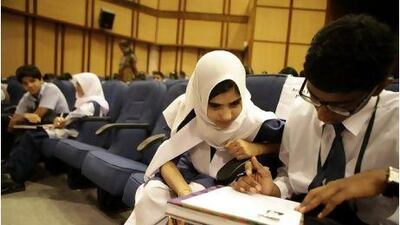ABU DHABI // That Mahatma Gandhi never won a Nobel Peace Prize despite being nominated five times was news to Indian students preparing for a quiz to mark the former leader's birthday yesterday.
Students from Indian schools in the Emirates pored over encyclopaedias and the internet to prepare for yesterday's competition on the theme of Gandhi and international non-violence, organised by the Indian Embassy in Abu Dhabi.
Eighteen Indian curriculum schools from the capital, Dubai, Sharjah and Al Ain took part.
"It was great fun searching for information. We got to know things like he never won the Nobel Prize, although he was nominated five times," said an animated Irene Joji, 13, a member of the winning team from the Abu Dhabi Indian School.
"Also, he was shy and timid when growing up. To think that he later turned out to be so strong and started a revolution is amazing."
Irene's teammate Sreeradh Radhakrishnan, 14, said: "He was not the best in studies and that was interesting to find out."
Gandhiji, as he is respectfully called in India, was nominated in 1937, 1938, 1939, 1947 and - days before his death at the age of 78 - in 1948 for the Nobel Prize. Later members of the Nobel Committee have publicly regretted the omission.
October 2 is a national holiday in India called Gandhi Jayanti, or Gandhi's birthday.
The UN General Assembly in 2007 decided to observe the occasion as the International Day of Non-Violence each year.
Gandhi's brand of non-violence, or satyagraha, inspired civil rights leaders around the world.
Known as Mahatma Gandhi to the world, Mohandas K Gandhi is hailed as Bapu, or the Father of the Nation, in India for leading a civil disobedience movement that helped to end 200 years of British colonial rule.
At the Indian Embassy auditorium in Abu Dhabi yesterday, pupils huddled over sheets of questions in the written round of the quiz.
A garlanded, black-and-white portrait of a smiling Gandhi looked over the serious students as they furiously scribbled their answers.
The schools brought squads of supporters who cheered on their teams and eagerly answered questions thrown open to the audience.
For runners-up Mohammed Thoufiq, 14, and his sister Fathima Rehuma, 13, quizzing is in the family.
"Quizzing is an art. You get to learn so much," said Mohammed, of Sherwood Academy, Abu Dhabi.
He and Fathima said their parents also took part in quizzes.
The contest covered other world leaders including Nelson Mandela, Martin Luther King Jr and Aung San Suu Kyi, the leader of the opposition in Myanmar.
"When students prepare for a quiz, they learn through different sources," said Birinder Kaur Batra, the quizmaster and a former school teacher. "It helps them get a better grasp in an interesting manner.
"Our aim was to show struggles not just in India, but civil disobedience movements in the Philippines, Georgia, the fall of the Berlin Wall, so they understand the relevance of non-violence."
The quiz did throw up questions about Gandhi's philosophy of turning the other cheek and not striking back. Most students agreed with his principles, but said these would be difficult to follow.
Akhila Roy, 13, a finalist from the Indian Islahi Islamic School, said: "If somebody slaps me, I would look to see where I could hit him back.
"Of course, I would try to not hit back but that doesn't always work. There is so much violence in today's world, so Gandhiji's principles of truth and fasting will work, but not always and not everywhere."
The students also made comparisons made between Gandhi and the Indian activist Anna Hazare.
A 12-day hunger strike that ended in August made Mr Hazare a hero to many in India and forced the government to consider changes to anti-corruption legislation.
"Days like this make you think of Gandhi's fight then and Anna Hazare in the present day," Irene said.
"The British didn't know what to do with Gandhi, and the [Indian] government was helpless when the whole nation supported Anna."


